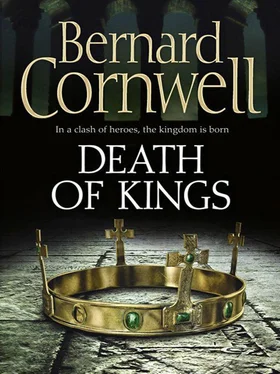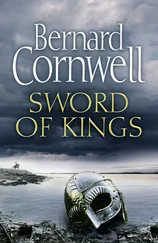So we marched there instead.
Edward wore his father’s crown at the Christmas feast. The emeralds glinted in the firelight of the great Roman hall at the top of Lundene’s hill. Lundene was safe.
A sword or axe had cut into my hip, though I had not realised it at the time. My mail coat was being mended by a smith, and the wound itself was healing. I remembered the fear, the blood, the screams.
‘I was wrong,’ Edward told me.
‘True, lord King,’ I said.
‘We should have attacked them at Cracgelad,’ he said, then stared down the hall where his lords and thegns were dining. He looked like his father at that moment, though his face was stronger. ‘The priests said you couldn’t be trusted.’
‘Maybe I can’t,’ I said.
He smiled at that. ‘But the priests say that God’s providence dictated the war. By waiting, they say, we killed all our enemies.’
‘Almost all our enemies,’ I corrected him, ‘and a king cannot wait on God’s providence. A king must make decisions.’
He took the reproof well. ‘ Mea culpa ,’ he said quietly, then, ‘yet God was on our side.’
‘The ditch was on our side,’ I said, ‘and your sister won that war.’
It had been Æthelflaed who delayed the Danes. If they had crossed the river during the night they would have been ready to attack earlier and they would surely have overwhelmed us long before Steapa’s horsemen came to the rescue. Yet most of the Danes had stayed in Huntandon, held there by the threat to their rear. That threat had been the burning halls. Æthelflaed, ordered by her brother to ride to safety, had instead taken her Mercian troops north and set the fires that had frightened the Danes into thinking another army was behind them.
‘I burned two halls,’ she said, ‘and one church.’
She sat on my left, Edward on my right, while Father Coenwulf and the bishops had been pushed to the ends of the high table. ‘You burned a church?’ Edward asked, shocked.
‘It was an ugly church,’ she said, ‘but big, and it burned bright.’
Burned bright. I touched her hand, which rested on the table. Almost all our enemies were dead, only Haesten, Cnut and Sigurd remained alive, yet to kill one Dane is to resurrect a dozen. Their ships would keep coming across the sea, because the Danes would never rest until the emerald crown was theirs, or until we had crushed them utterly.
Yet for the moment we were safe. Edward was king, Lundene was ours, Wessex had survived, and the Danes were beaten.
Wyrd bi  ful
ful  ræd.
ræd.
The Anglo-Saxon Chronicles are our best source for the events of the period during which the Angles and Saxons dominated Britain, but there is no single chronicle. It seems probable that Alfred himself encouraged the creation of the original text, which offered a year by year summary of events beginning with Christ’s birth, and that first manuscript was copied and distributed to monasteries who, in turn, kept updating their copies so that no two versions are alike. The entries can be maddeningly obscure and are not always reliable. Thus, for the year AD 793, the Chronicles record fiery dragons in the skies above Northumbria. In 902, the Chronicles record a battle at ‘the Holme’, a place that has never been identified though we know it was somewhere in East Anglia. A Danish army led by King Eohric and by the claimant to the throne of Wessex, Æthelwold, invaded Mercia, crossed the Thames at Cracgelad (Cricklade), harried Wessex and then retreated. King Edward followed them into East Anglia and took his revenge by ravaging Eohric’s land. Then comes the Chronicles’ tantalising account of the battle: ‘When he (Edward) meant to leave there, he had it announced to the army that they would all leave together. The Kentish stayed on there against his command and seven messages he had sent to them. The force came upon them there, and they fought.’ The entry then gives a list of the most notable casualties, among them Æthelwold, King Eohric, Ealdorman Sigelf, his son Sigebriht, and Beortsig. ‘On either hand,’ the Chronicles tell us, ‘much slaughter was made, and of the Danes there were more killed, though they had the battlefield.’ That suggests the Danes won the battle, but in winning, lost most of their leaders. (I am using a translation of the Chronicles by Anne Savage, published by Heinemann, London, 1983.)
What is most tantalising in that brief account is the puzzling refusal of the Kentish forces to withdraw, and my solution, that Ealdorman Sigelf was trying to betray the West Saxon army, is pure invention. We neither know where the battle was fought, nor what really happened there, only that there was a battle and that Æthelwold, Edward’s rival for the throne of Wessex, was killed. The Chronicles tell us about Æthelwold’s rebellion in a long entry for the year 900 (though Alfred’s death was in 899). ‘Alfred, son of Æthelwulf, passed away, six nights before All Saints Day. He was king over all the English, except for that part which was under Danish rule; and he held that kingdom for one and a half years less than thirty. Then his son Edward received the kingdom. Æthelwold, his father’s brother’s son, took over the manors at Wimbourne and at Christchurch, without the leave of the king and his counsellors. Then the king rode with the army until he camped at Badbury Rings near Wimbourne, and Æthelwold occupied the manor with those men who were loyal to him, and had barricaded all the gates against them; he said that he would stay there, alive or dead. Then he stole away under the cover of night, and sought the force in Northumbria. The king commanded them to ride after, but he could not be overtaken. They captured the woman he had seized without the king’s leave and against the bishop’s command, because she was hallowed as a nun.’ But we are not told who the woman was, or why Æthelwold kidnapped her, or what became of her. Again my solution, that it was Æthelwold’s cousin, Æthelflaed, is pure invention.
The Chronicles give us the bare bones of history, but without much detail or even explanations for what happened. Another mystery is the fate of the woman Edward might, or might not, have married; Ecgwynn. We know she gave him two children and that one of them, Æthelstan, would become immensely important to the creation of England, yet she vanishes from the record entirely and is replaced by Ealdorman Æthelhelm’s daughter, Ælflæd. A much later account suggests that Edward and Ecgwynn’s marriage was not considered valid, yet in truth we know very little of that tale, only that the motherless Æthelstan will, in time, become the first king of all England.
The Chronicles note that Alfred was ‘king over all the English’, but then adds the cautious and crucial caveat, ‘except for that part which was under Danish rule’. In truth most of what would become England was under Danish rule; all of Northumbria, all East Anglia, and the northernmost counties of Mercia. Alfred undoubtedly wanted to be king of all the English, and by the time of his death he was by far the most notable and powerful leader among the Saxons, but his dream of uniting all the lands where English was spoken had not been realised, yet he was fortunate in having a son, a daughter and a grandchild who were as committed to that dream as he was himself, and in time they would make it happen. That story is the story behind these tales of Uhtred; the story of England’s creation. It has always puzzled me that we English are so incurious about our nation’s genesis. In school it sometimes seems as if Britain’s history begins in AD 1066, and all that went before is irrelevant, but the story of how England came to exist is a massive, exciting and noble tale.
Читать дальше
Конец ознакомительного отрывка
Купить книгу

 ful
ful  ræd.
ræd.










